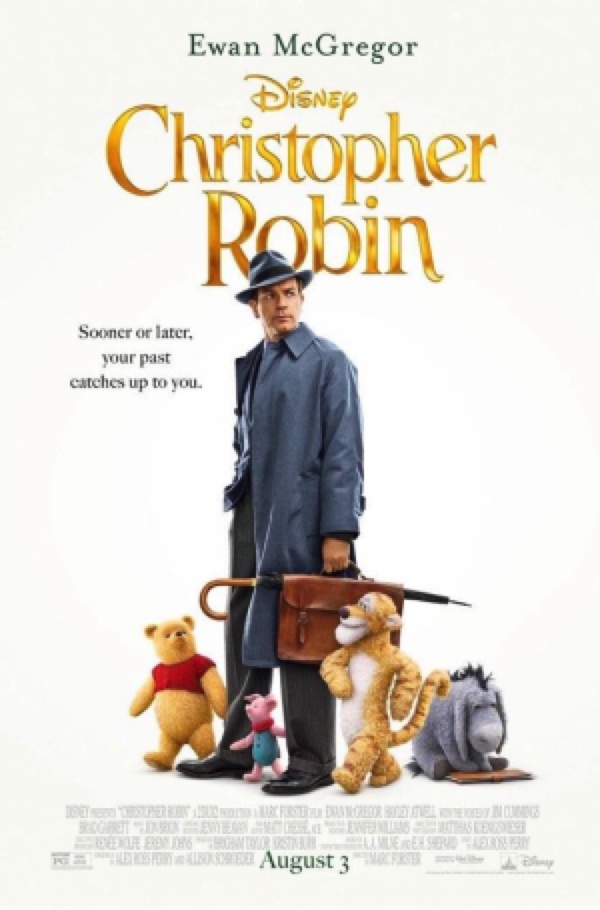
I grew up reading the Winnie the Pooh stories so I quickly became a fan of the new movie, “Christopher Robin,” directed by Marc Forster, starring Ewan McGregor as an adult Christopher Robin. Pooh always gave me a warm, happy feeling as a child. Reading the Pooh books as an adult, I realize how profoundly poignant they are as they speak about the innocence of childhood while purporting deep existential truths. Hayley Atwell, who plays Christopher’s wife, Evelyn, says that in this film, “Pooh represents a beacon of light…pure, unconditional love.” The film is not about a nostalgic look to the past, but a gentle look back in order to move forward with greater joy. The captivating subject matter and the beauty of the interlacing animation with real-life characters within a tightly woven script brings these most beloved characters to life. Forster says the film came about because his six-year-old daughter, who was watching a Pooh cartoon on a tablet, turned to him saying, “Can you finally do a movie for me?”
The movie begins with a goodbye party. Christopher Robin is growing up and he’s headed off to boarding school, leaving behind his friends of Hundred Acre Wood—Winnie, Tigger, Piglet, Eeyore, Kanga, Roo, Owl, and Rabbit. He tells Winnie the Pooh that he will never forget him. Life’s experiences and the death of his father mature Christopher. He eventually marries Evelyn and has a daughter, Madeline (Bronte Carmichael). Christopher serves in the British Army during World War II and comes home to find a job with Winslow Luggage. His work in London consumes him, so much so that he has little time to spend with his family. He even plans to send Madeline to boarding school even though she doesn’t want to go. The luggage company experiences financial difficulty and the administration plans to decrease expenditures by laying off most of Christopher’s staff. He is forced to forego his vacation plans at his old countryside cottage in Sussex to come up with a more viable solution. Evelyn and Madeline go without him.
Meanwhile in the Hundred Acre Wood, Pooh awakens to find all his friends gone and enters a door through a tree that leads to London near where Christopher lives. Shocked by Pooh’s appearance, Christopher travels with him by train to bring him back to Hundred Acre Wood. Through amusing antics with a talking bear, Christopher eventually makes it to Sussex without his wife knowing and ends up in Hundred Acre Wood helping Pooh find the others. The scene in which Christopher lures the frightened toys out of hiding by pretending to defeat a Heffalump is classic.
Casting McGregor as Christopher Robin was a stroke of genius. He’s the perfect choice and when he tells Pooh that he’s a “silly old bear,” it’s flawless. He captures well the simplicity of childhood that Christopher Robin has left behind, getting so involved in work that that he forgets what is really important in life. Atwell is underused but Carmichael rises to the challenge of being with the talking toys as they careen crazily through London trying to save Christopher from disaster with his boss, Old Man Winslow (Oliver Ford Davies).
So much of our lives are spent making money and working hard to keep all the activities of our lives in order that, sometimes, we forget the most important things, namely, the people in our lives. Marc Forster comments that as we get older, “life chisels away at our innocence…and it’s difficult to keep up that joy…yet Pooh, with his Poohisms, have this logic that is totally absurd and childlike, but they also have a lot of depth.” Christopher needed to be jolted from his frantic work in order to experience once again of wonder of his childhood dreams and fantasies. We, too, can also take life so seriously that we miss living it. “Christopher Robin,” with it’s humorous moments (which elicited hearty belly laughs from the kids in the audience), communicates a most profound lesson for adults: life happens. Make sure you pay attention to the many gifts it presents and enjoy the beauty all around you. Sometimes we have to become like little children again to be able to see clearly the gift that is life itself.
About the Author

Sr. Nancy is the Director of the Pauline Center for Media Studies and a Media Literacy Education Specialist. She has degrees in Communications Arts and a Masters in Theology and the Arts from Fuller Theological Seminary. She has extensive experience in the creative aspects of social media, print media, radio and video production as well as in marketing, advertising, retail management and administration.
Sr. Nancy has given numerous media mindfulness workshops, presentations and film retreats around the country to youth, young adults, catechists, seminarians, teachers and media professionals helping to create that dialogue between faith and media. She is a member of NAMLE (National Association of Media Literacy Educators), SIGNIS (World Catholic Association for Communicators) and THEOCOM (Theology and Communications in Dialogue) and board member of CIMA (Catholics in Media Associates). She is the author of a theology of popular culture called, A Sacred Look: Becoming Cultural Mystics from Wipf & Stock Publishing. Sr. Nancy is a theologian, national speaker, blogger and film reviewer.